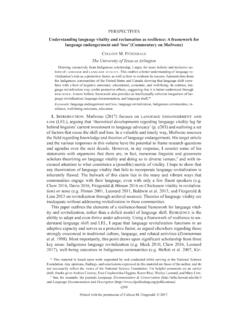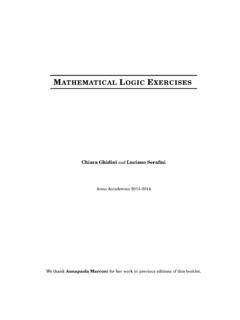Transcription of How did language begin? - Linguistic Society of America
1 How did languagebegin?Written by Ray JackendoffWhat does the question mean?In asking about the origins of human language , wefirst have to make clear what the question is. Thequestion is not how languages gradually developedover time into the languages of the world , it is how the human speciesdeveloped overtime so that we and not our closest relatives, the chimpanzees and bonobos became capable ofusing language . And what an amazing development this was! Noother natural communication system is like humanlanguage. Human language can express thoughts onan unlimited number of topics (the weather, the war,the past, the future, mathematics, gossip, fairy tales,how to fix the ).
2 It can be used not just toconvey information, but to solicit information (ques-tions) and to give orders. Unlike any other animalcommunication system, it contains an expression fornegation what is notthe case. Every human lan-guage has a vocabulary of tens of thousands ofwords, built up from several dozen speech can build an unlimited number of phrasesand sentences out of words plus a smallish collec-tion of prefixes and suffixes, and the meanings ofsentences are built from the meanings of the individ-ual words. What is still more remarkable is thatevery normal child learns the whole system fromhearing others use it. Animal communication systems, in contrast, typicallyhave at most a few dozen distinct calls, and they areused only to communicate immediate issues such asfood, danger, threat, or reconciliation.
3 Many of thesorts of meanings conveyed by chimpanzee commu-nication have counterparts in human 'body lan-guage'. For animals that use combinations of calls(such as some songbirds and some whales), themeanings of the combinations are not made up ofthe meanings of the parts (though there are manyspecies that have not been studied yet). And theattempts to teach apes some version of human lan-guage, while fascinating, have produced only rudi-mentary results. So the properties of human lan-guage are unique in the natural world. How did we get from there to here? All present-daylanguages, including those of hunter-gatherer cul- tures, have lots of words, can be used to talk aboutanything under the sun, and can express far back as we have written records of humanlanguage 5000 years or so things look basical-ly the same.
4 Languages change gradually over time,sometimes due to changes in culture and fashion,sometimes in response to contact with other lan-guages. But the basic architecture and expressivepower of language stays the same. The question, then, is how the properties of humanlanguage got their start. Obviously, it couldn't havebeen a bunch of cavemen sitting around and decid-ing to make up a language , since in order to do so,they would have had to have a language to startwith! Intuitively, one might speculate that hominids(human ancestors) started by grunting or hooting orcrying out, and 'gradually' this 'somehow' developedinto the sort of language we have today.
5 (Such spec-ulations were so rampant 150 years ago that in 1866the French Academy banned papers on the origins oflanguage!) The problem is in the 'gradually' and the'somehow'. Chimps grunt and hoot and cry out, happened to humans in the 6 million years orso since the hominid and chimpanzee lines diverged,and when and how did hominid communicationbegin to have the properties of modern language ? Of course, many other properties besides languagedifferentiate humans from chimpanzees: lowerextremities suitable for upright walking and running,opposable thumbs, lack of body hair, weaker mus-cles, smaller teeth and larger brains. According tocurrent thinking, the changes crucial for languagewere not just in the size of the brain, but in its character: the kinds of tasks it is suited to do asit were, the 'software' it comes furnished with.
6 Sothe question of the origin of language rests on thedifferences between human and chimpanzee brains,when these differences came into being, and underwhat evolutionary pressures. What are we looking for?The basic difficulty with studying the evolution oflanguage is that the evidence is so sparse. Spokenlanguages don't leave fossils, and fossil skulls onlytell us the overall shape and size of hominid brains,not what the brains could do. About the only defini- tive evidence we have is the shape of the vocal tract(the mouth, tongue, and throat): Until anatomicallymodern humans, about 100,000 years ago, theshape of hominid vocal tracts didn't permit the mod-ern range of speech sounds.
7 But that doesn't meanthat language necessarily began then. Earlierhominids could have had a sort of language thatused a more restricted range of consonants andvowels, and the changes in the vocal tract may onlyhave had the effect of making speech faster andmore expressive. Some researchers even proposethat language began as sign language , then (gradu-ally or suddenly) switched to the vocal modality,leaving modern gesture as a issues and many others are undergoing livelyinvestigation among linguists, psychologists, andbiologists. One important question is the degree towhich precursors of human language ability arefound in animals. For instance, how similar are apes'systems of thought to ours?
8 Do they include thingsthat hominids would find it useful to express to eachother? There is indeed some consensus that apes'spatial abilities and their ability to negotiate theirsocial world provide foundations on which thehuman system of concepts could be built. A related question is what aspects of language areunique to language and what aspects just draw onother human abilities not shared with other issue is particularly controversial. Some researchersclaim that everythingin language is built out of otherhuman abilities: the ability for vocal imitation, the abilityto memorize vast amounts of information (both neededfor learning words), the desire to communicate, theunderstanding of others' intentions and beliefs, and theability to cooperate.
9 Current research seems to showthat these human abilities are absent or less highlydeveloped in apes. Other researchers acknowledge theimportance of these factors but argue that hominidbrains required additional changes that adapted themspecifically for language . Did it happen all at once or in stages?How did these changes take place? Some researchersclaim that they came in a single leap, creatingthrough one mutation the complete system in thebrain by which humans express complex meaningsthrough combinations of sounds. These people alsotend to claim that there are few aspects of languagethat are not already present in animals. Other researchers suspect that the special propertiesof language evolved in stages, perhaps over somemillions of years, through a succession of hominidlines.
10 In an early stage, sounds would have beenused to name a wide range of objects and actions in the environment, and individuals would be able to invent new vocabulary items to talk about newthings. In order to achieve a large vocabulary, animportant advance would have been the ability to'digitize' signals into sequences of discrete speechsounds consonants and vowels rather thanunstructured calls. This would require changes in theway the brain controls the vocal tract and possiblyin the way the brain interprets auditory signals(although the latter is again subject to considerabledispute).These two changes alone would yield a communicationsystem of single signals better than the chimpanzeesystem but far from modern language .





